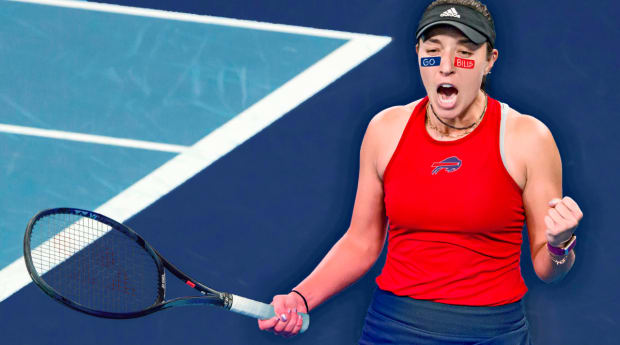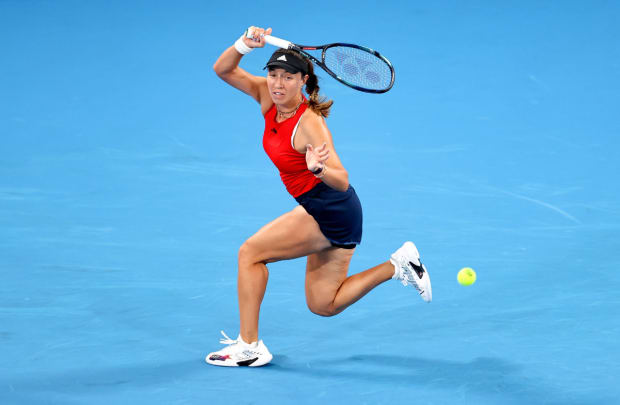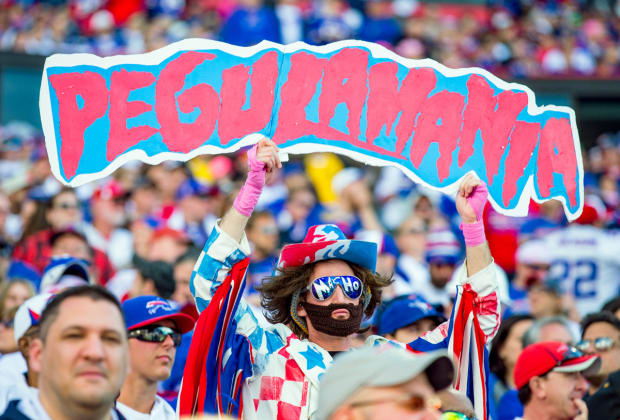The Bills ranked among the league leaders in wins this season and are short-listed amid the favorites to win the Super Bowl. Led by a quarterback who spent much of the season undertaking a convincing impression of an MVP candidate, the team sometimes presented football at its most elevated, an 11-man braid of beauty, a symphonic whole, a team greater than the sum of its component parts.
But not always. Some of the team’s wins have been dirty, grindy, patchy, scratchy crawl-through-the-weeds, sleep-in-the-woods, forage-for-bugs affairs. For one fan in particular, a 29-year-old who catches as many games as she can, those were the most meaningful victories. “The perfect stuff when everything is clicking? Great. [But I like] winning those games where you’re playing like crap, when maybe it was horrible statistically. But you’re, like, Who cares? They won. Give me those tough conditions and gritty wins.”
Those are the observations of Jessica Pegula, who speaks from a position of knowledge and experience. Currently the No. 3-ranked tennis player in the world, she’s coming off a breakthrough WTA season that saw her win 42 singles matches and an additional 31 doubles matches, the most combined wins of any pro player in 2022, male or female. Generously listed at 5’7″, she’s armed with no titanic serve or splashy signature shot. She would not win a footrace against, say, her frequent doubles partner, Coco Gauff. But Jessica Pegula simply knows how to win, how to grind out victories, as she did when she started ’23 by smoking world No. 1 Iga Swiatek at the United Cup.
She also happens to be the daughter of Terry and Kim Pegula, owners of the pro football team based in Western New York.
So it is, the Bills enter the playoffs with a more-than-decent shot to win the first Super Bowl in franchise history. And concurrently, at the 2023 Australian Open, which begins Monday in Melbourne, the owners’ daughter enters with a more-than-decent shot to win her first major. And true to form, she is having none of it, laughing dismissively when the idea of a sort of Bills Nation Double is broached. “Take the question back,” she says laughing. “Don’t even go there.”

Andy Cheung/Getty Images
As sports butterfly effects go, this is a wild one. But stick with us here: If Sidney Crosby isn’t quite so easy to look at, if he’s a Shrek on ice skates, there may not even be an NFL franchise in Buffalo.
We’ll explain. Fifteen or so years ago, Terry Pegula, an oil and gas magnate, was raising his family in the Pittsburgh suburbs. His two youngest daughters, Laura and Jessica, then preteens, became enamored with the local pro hockey team and, in particular, its dashing young star. “It was Sidney Crosby’s rookie year,” recalls Jessica. “We were in love with him. So we started watching all the Penguins games. My dad was like, ‘Why are you watching the Penguins?’”
Terry liked hockey plenty but was partial to the Buffalo Sabres, having worked in Western New York in the 1970s. Same for Kim, who was born in South Korea and raised outside Rochester. Terry had grown disenchanted with the NHL during the various lockouts and had become a big supporter of the hockey program at his alma mater, Penn State, eventually donating more than $100 million for a new ice arena. But his daughters say that their fervent rooting for the early-Crosby-era Penguins rekindled their Dad’s interest in pro hockey. “He would get kind of mad that we liked [the wrong team],” recalls Jessica, “and then he started watching hockey again.”
In 2010, Terry Pegula took East Resources—the oil and gas exploration company he started in the 1980s with a $7,500 loan from family and friends—and sold it to Royal Dutch Shell for a reported $4.7 billion. He had some disposable income to dispose of. In 2011, the Sabres were put up for sale, and Terry and Kim bought the team for $189 million. (What is either a bit of foreshadowing or simply coincidence: One of the previous owners, Tom Golisano, is the husband of tennis star Monica Seles.)
Handsome return on investment aside, the Pegulas immediately realized that they liked owning sports teams. They also got the Buffalo Bandits of the National Lacrosse League as part of the purchase and began developing real estate around the arena.
Meanwhile, when she wasn’t watching hockey and crushing on the Penguins’ best player, Jessica—known to most as Jessie—was playing another sport: tennis. Her older sister, Laura, had played for the University of Pittsburgh. Jessie set her sights even higher, hell-bent on becoming a pro. Though not a top junior, she had enough success in the juniors that the family moved to Hilton Head, S.C., and then to Florida, partly in service of her tennis.
In her mid- to late teens, Pegula was overshadowed by contemporary American players like Sloane Stephens and Madison Keys, and was recruited by top college programs including Michigan, Duke and UCLA. Thanks, but no thanks, she told them all. She’d continue to stay the course and try to make it as a pro, offsetting her modest arsenal of weapons by, in effect, playing like the engineer’s daughter she is, looking at matches as a series of problems to be solved.

Brendon Thorne/Getty Images
Around then, in the early 2010s, another Buffalo pro sports franchise team faced an uncertain future. Ralph Wilson had brought an AFL team to town in 1959, paying $25,000 for what would become the Buffalo Bills. The franchise won the league titles in 1964 and ’65, and would join the NFL as part of the ’70 merger. The Bills were something akin to the Packers-East, a small-market, cold-market team with less a conventional fan base than a tribe of loyalists.
But by 2013, with Wilson deep in his 90s and his health fading, the fate of the franchise was up in the air. Though the Bills had come within a game of winning the Super Bowl in four consecutive years in the 1990s, they had fallen on tough times and gone two decades without even winning a divisional title. Marooned in a small city with a population and economy declining in equal measure, there was abundant talk that the team would relocate, maybe to nearby Toronto, the NFL finally able to place a full-time team outside the United States.
When Wilson died in 2014, his estate put the team up for sale. The anticipated price of the team, reportedly $1.2 billion, looks like a steal today. (Consider: The Denver Broncos recently sold for $4.65 billion.) But $1.2 billion for a small-market NFL team was considered a stretch. Potential buyers such as Jon Bon Jovi and a figure described then as “billionaire developer Donald Trump” put together groups and submitted bids.
They were blown out of the lake by the aggressive $1.4 billion offer, submitted by the same couple that owned the Sabres. Apart from their superior finances, Terry and Kim Pegula had all the right political backing, not least because of their commitment to keeping the team in the area.
As New York senator Chuck Schumer said when the sale was announced, “The Bills and their passionate fans will now be able to breathe a huge sigh of relief. The Pegulas are the perfect choice to carry on Ralph Wilson’s indelible legacy—like Ralph, they have a true commitment to Western New York, are people of serious integrity and will be excellent owners. Most importantly, based on extensive conversations I have had with Terry over the past few months, he and Kim are deeply committed to keeping the Buffalo Bills in Western New York for generations to come.”

Brett Carlsen/Getty Images
In the early years of her pro career, Jessie Pegula could relate to the fate of the team her parents had purchased. She had been born in 1993, just days after the Bills’ last Super Bowl appearance, and Buffalo had barely made the playoffs since. She technically turned pro in 2009 and for years was exiled outside the top 100, trying to work her way up tennis’s equivalent of a depth chart. There were blowout defeats and losing streaks, and there was wait-til-next-year optimism.
She spent most of the year on the caravan, tacking from one far-flung event to the next in search of the almighty ranking points. There were missed milestones and family celebrations. There were losses and there were injuries. For years, there were abundant reminders that the charmed existence of a star is illusory to the vast majority of pros.
Inasmuch as she came from a family of great financial means, Pegula, strenuously, took pains not to use the family wealth to advance her career, much less flaunt it. Her parents might be billionaire sports team owners, but she was flying coach, staying with the other players at La Quintas and Hampton Inns by the interstate, and trying to economize and stretch her meager prize money as far as it would go. She usually traveled without family members and made her own schedule and plans. “We raised all our kids to be independent,” Kim Pegula told me through email earlier this year.
“Trust me,” says Jimmy Arias, a former pro—and coincidentally a Buffalo native—who has spent time working with Pegula. “She has spent plenty of time at rental car counters and in crappy hotels. Not exactly stepping on and off private planes here.”
Arias has noted that there is precedent for a tennis player with a father who owned a pro football team: Carling Bassett, daughter of John Bassett, who ran the USFL’s Tampa Bay Bandits. But that was an entirely different dynamic, as Carling was a sort of proto-Kournikova, a popular top-10 player while still a teenager. Pegula’s situation was a little different. The success did not come quickly. Consider: In 2017, Pegula’s last several events took her to Macon, Ga., (prize money $407); Tyler, Texas ($1216); Waco, Texas ($709); and Norman, Okla., ($126). She finished that year, a season addled by injuries and surgery, ranked No. 625 in the world.
But when she asked herself an existential question—is this really what I want to be doing with my life?—it only reinforced her determination and commitment. “You’re missing out on everything. You’re missing out on birthdays and holidays, and you’re traveling to these tournaments,” she says. “But I would take time off, a week or two, or I’d go somewhere. I would just always find myself not getting bored, but just being like, I miss playing. I want to play.”
Even when she was injured, facing the specter of rehab, she didn’t stay down long. “I was like, I don’t know if I can do this. Maybe this is just a waste of time. Maybe I should go back to school. Maybe I should just do something else. And then after a week I was like, What am I talking about? This is what I want. In my mind, excuse my language, I was just like, get your s— together. And I did.”
Along the way, something else happened. For all the players who take pains to distance themselves from their colleagues—“I was never here to make friends,” Maria Sharapova once famously sniffed—Pegula became a sort of gravitational center. Her singles ranking might be No.3; her popularity ranking among her peers may be even higher. Her wedding last year drew all manner of players. That she plays doubles with Gauff, more than a decade her junior, speaks volumes.
Wringing everything from a style that’s short on elegance and long on sweaty persistence and discipline, Pegula began turning her career around in 2019, finally winning more than she lost. Coincidence or not, it was right around the same time the Bills were doing the same. Both made key coaching decisions. Pegula hired the well-regarded David Witt, a longtime aide-de-camp of Venus Williams; the Bills hired Sean McDermott.

Daniel Pockett/Getty Images
A year ago, Pegula, seeded for the first time, reached the quarterfinals at the Australian Open before losing to the eventual champ, Ash Barty. That same weekend, the Bills lost that overtime classic to the Chiefs in the division round of the NFL Playoffs, the equivalent of the quarterfinals. Wild coincidence. But Pegula is reluctant to draw too many parallels. “It sucked last year when they lost with 13 seconds left, right?” she says. “But like, does it really affect me? I mean, no, not my tennis.”
And that pretty much sums up her relationship with the folks’ NFL team. She roots for the team, sometimes even signing courtside cameras “Go Bills.” When Bills safety Damar Hamlin went into cardiac arrest last week, Pegula, a world away in Australia, was quick to tweet this. She watches games when she can, though her schedule can complicate matters. (The weekend the Bills won a scratch-it-out 23–20 affair against the Ravens, Pegula was in Mexico, winning the Guadalajara Open, the biggest title of her career.)
But there are limits to the parallels and symmetries. Terry Pegula might have taken a stopwatch to Wyoming while he assessed Josh Allen before drafting him; Jessie Pegula says she isn’t sure she’s even met Josh Allen in person. “It’s cool,” she says that some Bills fans follow her tennis career. But, she notes, it’s not as though they’re painting their faces, leaving Orchard Park and coming en masse to watch her play in Sydney and Shanghai.
Kim and Terry Pegula, controversially, recently secured $850 million financing from New York State and Erie County to apply to a new $1.4 billion facility across the street from the current venue. Conveniently or not, that’s not something Jessie really keeps track of. The extent of her financial entanglements around the family business? She and Kelly once, for kicks, opened Healthy Scratch, a concession stand inside Harbour Center where Sabres fans could order acai bowls and cold-pressed juices. The business, says Pegula, was a COVID-19 casualty. Not that the failure mattered much: In less than a decade, the Pegulas may well have tripled their $1.4 billion investment on the Bills. Jessie’s much more interested in her personal finances, the $3,6111,716 in prize money she earned in 2022, giving some cushion to fly business class, fly her husband, Taylor Gahagen, to matches or pick up another full-time team member if necessary.
She squeezes in attending games in person when she can, a challenge given her tournament schedule. She didn’t make it to Buffalo once in the 2022 season. When Pegula wasn’t touring, she was far more inclined to spend time with Kim, who was hospitalized in June with “an unexpected health issue” that the family has otherwise kept private. Jessie had considered taking months entirely off but realized tennis’s therapeutic powers. “It ended up being a way to get my mind off things,” she says. “Not a lot of people can say this, but tennis was de-stressing. So I’m very thankful for that.”
Jessie goes to Australia with a clear mind and swollen hopes. She’ll bring her functional, pragmatic, level-headed, grind-it-out tennis to bear. She’ll wake up early, if need be, to watch her favorite NFL team advance in its single-elimination tournament.
And if, on Feb. 12, the family business is on display in Glendale, Ariz., playing in Super Bowl LVII, where will she be? “You know what?” she says. “I mean, if they’re in the Super Bowl, that’s like a once-in-a-lifetime kind of thing. Do I play Dubai? Or do I go watch the Bills in the Super Bowl? If that’s the choice, things are going pretty well, can’t complain. I think that might be a good exception to miss a tournament.”

















